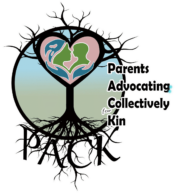PACK Learning Hub
This course is designed to help parents, peers, and service providers understand the unique challenges faced by mothers and birthing parents who are at a higher risk of having their children taken into government care. Through seven modules, the course aims to raise awareness about the ongoing challenges to parental rights and the trauma families experience when children are apprehended. It provides tools to prevent child apprehension, minimize the harm when it does happen, and support the reunification of families. This course empowers participants to advocate for their rights and navigate difficult situations with government agencies, all while focusing on keeping families together.


About PACK’s eLearning
This course was developed by Parents Advocating Collectively for Kin (PACK) in collaboration with the Provincial Perinatal Substance Use Program (PPSUP) in Women’s Hospital and Provincial Health Services Authority (PHSA).
Parents Advocating Collectively for Kin (PACK) is an alliance of individuals from British Columbia, including those who currently use or have used illicit drugs, working alongside committed allies. In the midst of a devastating public health crisis causing record numbers of overdose deaths, PACK advocates for increased support for the most vulnerable members of the substance-using community. Mothers and birthing parents who use substances face intense scrutiny and stigma, perpetuating outdated and harmful policies that must be addressed. Through collective action and advocacy, PACK aims to create a more just and supportive environment for all families affected by substance use.
For Family Members and Caregivers


For families and caregivers, these modules offer valuable insights into the challenges faced by mothers and families affected by substance use and trauma. They provide an understanding of how systems like child welfare and drug policy disproportionately affect certain groups, particularly women, Indigenous families, and young mothers. Caregivers will gain tools to support their loved ones with compassion, navigating legal systems, and addressing the emotional and psychological impacts of trauma. The focus on culturally sensitive approaches, harm reduction, and bodily autonomy will enable families to offer more effective and empathetic care to their loved ones.
For Supporting Professionals
These modules provide peer support workers with essential knowledge and practical tools to better assist individuals and families who face unique challenges, particularly those dealing with substance use, trauma, and systemic inequities. Each module offers guidance on navigating complex systems such as child welfare, advocating for vulnerable populations like teen moms and Indigenous families, and understanding the historical and ongoing effects of colonialism and drug policy on marginalized communities. Peer workers will learn how to provide trauma-informed, non-judgmental support and empower their peers to advocate for their rights, improving the overall well-being of the people they support.
Common FAQs
Yes, but you must register – and complete the course content – in order to receive a certificate.
No, you don’t need to register to access or take the modules. However, registration is necessary if you want to receive a certificate.
The modules are completely free as a service to the community.
These modules are free and open to everyone. Feel free to share them with your friends, family, and community members.
